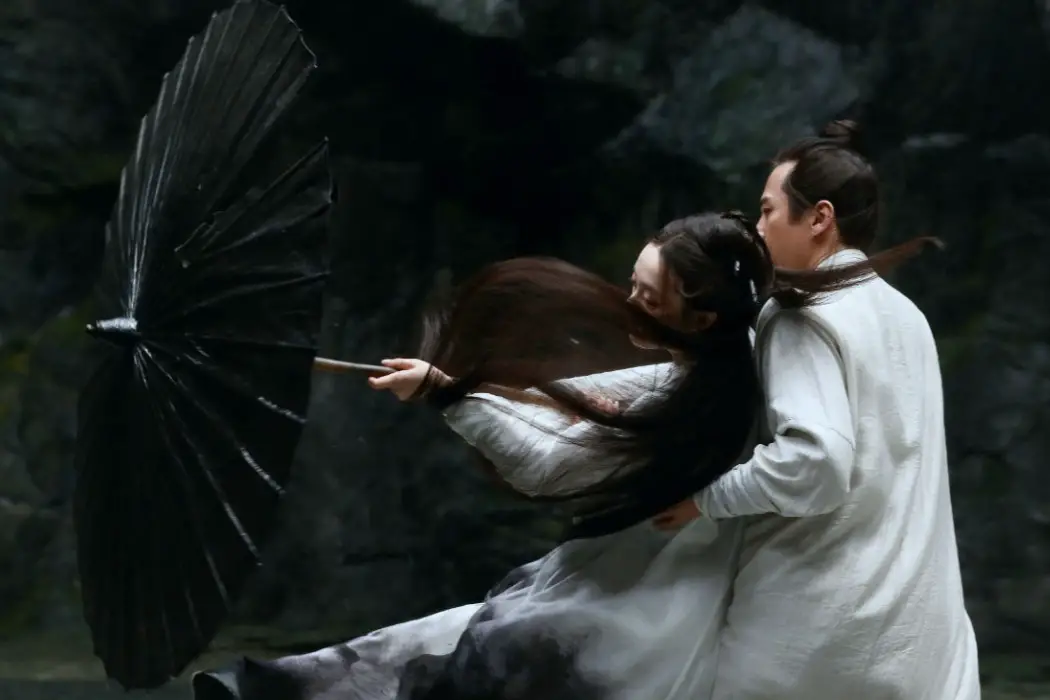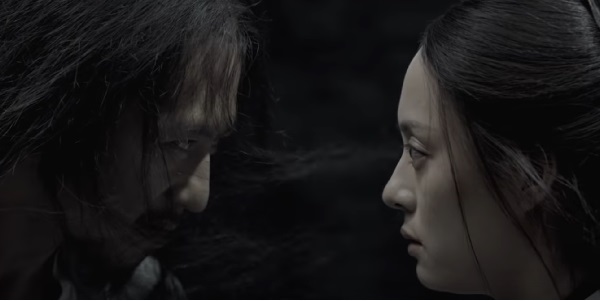SHADOW: The Means Of Yin

Ben is a former student of cognitive science who is…
Zhang Yimou‘s 2002 wuxia film Hero was a smash hit, pulling in unprecedented sums of money upon its release in the United States. Critics invariably praised the beauty of its colorful flashback sequences and intricate fighting scenes. Hero shows us several contradictory flashbacks depicting the same period of time, each one characterized by a color: one is full of blazing red banners, another is bathed in a cool blue, and so on. In the present, the film’s nameless hero (Jet Li) is conveying these stories to the emperor in his palace – an environment of pure gray.
The film culminates a gesture made by the emperor: he gives the nameless hero his sword. The hero takes this display of vulnerability as proof that the emperor is trustworthy. Critic and academic J. Hoberman disliked this positive depiction of imperial power and compared the film to fascist propaganda. I don’t wholly disagree, but I don’t think the film is quite that credulous. The overwhelming grayness of the emperor’s palace and the perpetually overcast sky in his territory tell us that his authoritarianism sucks all the color out of life.
Nevertheless, it’s hard to doubt the emperor’s integrity while watching Hero. In this respect, Zhang‘s newest film, Shadow, could not be more different. Royals, military officers, courtiers; Shadow portrays the very best of them as hapless fools, and the rest as cynical anglers for power. There are perhaps a couple heroic characters, but few opportunities for heroism. And this time, the whole film is gray.
Colorless Empire
Shadow is just as heightened as Hero. They’re both melodramatic, it’s just that Shadow‘s record of romances and betrayals play out differently. It doesn’t wallow in cynicism; this is less complaint, more ambitious, plus some laughing at the expense of people who deserve it.
Hero took place at the advent of Qin Shi Huang, first emperor of unified China. That was in the 3rd Century BCE. Shadow takes place a few hundred years later in the age of the Three Kingdoms – in other words, at a time when the empire Qin established had become fragmented and embroiled in war. The main character (Deng Chao) is a man of common birth who serves as the body double, or shadow, of a powerful military commander (also Deng Chao). They serve King Shi Liang (Zheng Kai), who has recently lost a city called Jing to their adversaries, Yang Cang and his son Yang Ping (Hu Jun and Leo Wu respectively). After being severely wounded by Yang Cang, the Commander goes into hiding and has the shadow take his place in public. The shadow deceives both the Yangs and Shi Liang while the Commander operates behind the scenes, developing a scheme to retake Jing.
Meanwhile, as the commander and Shi Liang connive to defeat the Yangs, the plot becomes complicated by the actions of the Commander’s wife Xiao’ai (Sun Li) and Shi Liang’s sister Qingping (Guan Xiaotong). Qingping hopes to avoid being married off by Shi Liang for political reasons and Xiao’ai must play along with the shadow’s deception.

Again, the film is almost wholly gray, even though the colors are amply saturated. The sets consist of gray objects and the actors all wear gray garments. Aesthetic variety comes more in textures than in colors: the royal palace is full of pictures painted on a translucent, gossamer material hanging everywhere; the commander’s hideout and the battlefields in Jing are made of unforgiving stone. Everyone in the palace wears flowing robes; the Yangs wear thick plates of metal armor.
The fight scenes feature the elaborate choreography and impossible movements typical of wuxia films. They employ slow motion to highlight not only important points in combat, but also the rainwater sliding off the fighters’ weapons and the vibrations passed through their thin metal blades. During the film’s climactic fight, these physical details of weaponry play into the fighters’ tactics and reflect their character and status. We see similar elements in some tense scenes in which Xiao’ai plays zither music. At one point, she plays the zither in an adversarial duet, her hands flying over the vibrating metal as if she were throwing sharp sounds at her enemy. The film crosscuts between this and a duel between martial artists, highlighting the importance of technical prowess, hidden motives, and the many modes of struggle for survival.
The Necessity of Yin
At the film’s turning points, we see a familiar symbol: the yin and yang. This is, of course, where the Yangs get their family name: in their appearance and their behavior, they embody hardness and authority, and other characters compare them to a blazing fire. All of these belong to the concept of yang, brightness. But the Yangs aren’t our main characters. They’re strong, but easy to understand. This film is more interested in the yin: the disorder that changes the world, the water that seeps into cracks and breaks things down with patience and yielding.
Xiao’ai and the shadow exist in this realm, in a position to break things apart from the inside. Qingping takes on the same role when she can’t take anymore of Shi Liang’s officiousness. These three, plus an army of commoners and prisoners enlisted by the Commander, are all figures who are expected to be obedient by the other main characters in the film, but are also expected to turn everything on its head.

There’s romance and melodrama in Shadow, and while it’s less emphasized than in Zhang‘s other wuxia films, it pairs well with the Machiavellian intrigue. Given the extreme seemliness required in Shi Liang’s court, one wrong move could get you thrown under the bus; on the other hand, given the Commander’s cloak-and-dagger tactics, one person’s decision could change everyone else’s fate. Private passions could change everything, even in ways that endanger their bearers.
Shadows: Rocks and Water
Shadow has a lot in common with Hero and House of Flying Daggers, Zhang‘s other hit in North America. But Deng Chao‘s burlesque performance as the Commander emphasizes his amorality so much that it colors how we see the rest of the film. We see the lies or naiveté inside whatever the film shows us, except for the natural elements of rocky terrains and rainwater, indifferent to human conflict. Passion is still there, but when the setting is bigger than the characters, perceptiveness is more important.
Shadow gets its wider release in the U.S. in early 2019. Whether it will be another hit remains to be seen; personally, I hope it will be, though I’m wary of its different appeal. Even if it’s not, I’d still recommend seeing it when you can.
How do you feel Shadow compares to more colorful, more romantic martial arts films?
Shadow debuted in North America on September 10, 2018 and in the U.K. on October 9, 2018. Well Go USA Entertainment has announced an early 2019 wide release date for the United States.
Does content like this matter to you?
Become a Member and support film journalism. Unlock access to all of Film Inquiry`s great articles. Join a community of like-minded readers who are passionate about cinema - get access to our private members Network, give back to independent filmmakers, and more.
Ben is a former student of cognitive science who is currently trying to improve his writing style and ability to understand and appreciate films containing unfamiliar perspectives. He tries not to hold films to a strict set of criteria, but does believe that strong movies can change your outlook on the world. His favorite films include Whisper of the Heart, Hellzapoppin', Foolish Wives, 42nd Street, and the work of Charlie Chaplin.













